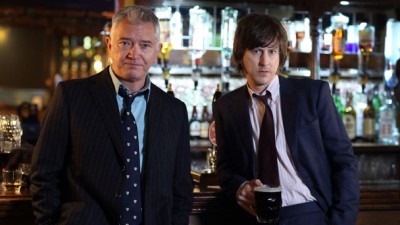| Reviews & Columns |
|
Reviews DVD TV on DVD Blu-ray 4K UHD International DVDs In Theaters Reviews by Studio Video Games Features Collector Series DVDs Easter Egg Database Interviews DVD Talk Radio Feature Articles Columns Anime Talk DVD Savant Horror DVDs The M.O.D. Squad Art House HD Talk Silent DVD
|
DVD Talk Forum |
|
|
| Resources |
|
DVD Price Search Customer Service #'s RCE Info Links |
|
Columns
|
|
|
George Gently - Series 6
As before, the series is adapted from the "George Gently" novels (about three dozen, published between 1955-1999) written by the late Alan Hunter. George Gently - Series 6 consists of four TV films on two Blu-rays running a bit over 90 minutes apiece. Acorn Media is releasing both the DVD and Blu-ray versions simultaneously and with the same SRP. I'd go with the Blu-ray if I were you.
Series 4 consisted of just two feature-length stories, while for Series 5 the number was upped to four, ending with that cliffhanger climax. However, audiences had to wait a year-and-a-half to learn to the fate of police Inspector George Gently (Martin Shaw) and his Detective Sergeant, John Bacchus (Lee Ingleby), the fifth series airing in September 2012 and the sixth series commencing in February 2014.
Set in 1969, both men have physically recovered from their wounds, but Bacchus surprises Gently by announcing his intention to resign from the force. In contrast to the irritating, intolerant young reactionary Bacchus had been in earlier seasons, here his near-death wounding compounds his preexisting, soul-eating cynicism with a new profound existentialism. Why risk his neck investigating the underbelly of British society? What's the point? In "Gently Between the Lines," law and disorder are further blurred when Bacchus is compelled to serve out his remaining time on the force investigating the death of an apparent protester held in custody.
This creates an interesting relationship challenge for Gently, who dearly wants to hold onto his hotheaded young protégée while having to rein in a cop who no longer cares and who has lost what little sense of delicacy and diplomacy Gently had for years been trying to instill in him, this on top of Bacchus's fear and hesitation to again put himself in harm's way.
Further, the erosion of Bacchus's relationship with his estranged wife, and an inequitable custody agreement in which he can only rarely see his young daughter, adds yet more strain. In this, Gently surreptitiously intercedes.
The episode I found most intriguing was "Blue for Bluebird." At its best George Gently realistically explores ‘60s cultural and societal issues with 21st century hindsight. In this case it's the since-vanished and singularly British phenomenon of holiday camps, for which the British feel a nostalgia not unlike Americans have for the contemporaneous drive-in movie theater.
The holiday camp was an inexpensive alternative for lower-middle class Brits, places where guests stayed in chalets on privately owned land which included facilities such as funfairs (small amusement parks), swimming pools, movie theaters, ballroom dancing, and other carefully choreographed social gatherings. By the late-1960s such places were in sharp economic decline (as depicted, comically, in the hilarious Carry On Camping) with owners of such venues sometimes taking extreme measures trying to keep them afloat.
"Blue for Bluebird" rather ingeniously explores one such place, and the show's recreation of the holiday camp atmosphere seems pretty dead on. (The episode was filmed on location at a place called Brownrigg Lodges, though altered substantially to obtain the period authenticity.)
Both Shaw and Rohr are excellent in this series. Ingleby's character has improved markedly, while Shaw, best known in America for this and his previous series, Judge John Deed though a mainstay of British television since the ‘70s, is as eminently watchable as ever. (Viewers interested in seeing a very young Shaw in his prime should check out Network's British Blu-ray of The Professionals, released just last week.)
Video & Audio
Episodes are presented in extremely good and apparently complete and unaltered 16:9 enhanced widescreen transfers. The image is impressively sharp and rich in color throughout. The Dolby Digital stereo, supported by optional SDH English subtitles, is state of the art.
Extra Features
Supplements are more bountiful this time, with three short featurettes (in high-def): "An Interview with [Guest Star] Pixie Lott," "Behind the Scenes," and "The Making of George Gently." Also included is a photo gallery, text-only interviews, and a brief, text-only list of "1969 Facts."
Parting Thoughts
Inspector George Gently has gradually improved over the years and, at its best, is above average by British police procedural/mystery standards. Recommended.
Stuart Galbraith IV is the Kyoto-based film historian and publisher-editor of World Cinema Paradise. His credits include film history books, DVD and Blu-ray audio commentaries and special features.
|
| Popular Reviews |
| Sponsored Links |
|
|
| Sponsored Links |
|
|
| Release List | Reviews | Shop | Newsletter | Forum | DVD Giveaways | Blu-Ray | Advertise |
|
Copyright 2024 DVDTalk.com All Rights Reserved. Legal Info, Privacy Policy, Terms of Use,
Manage Preferences,
Your Privacy Choices | |||||||















